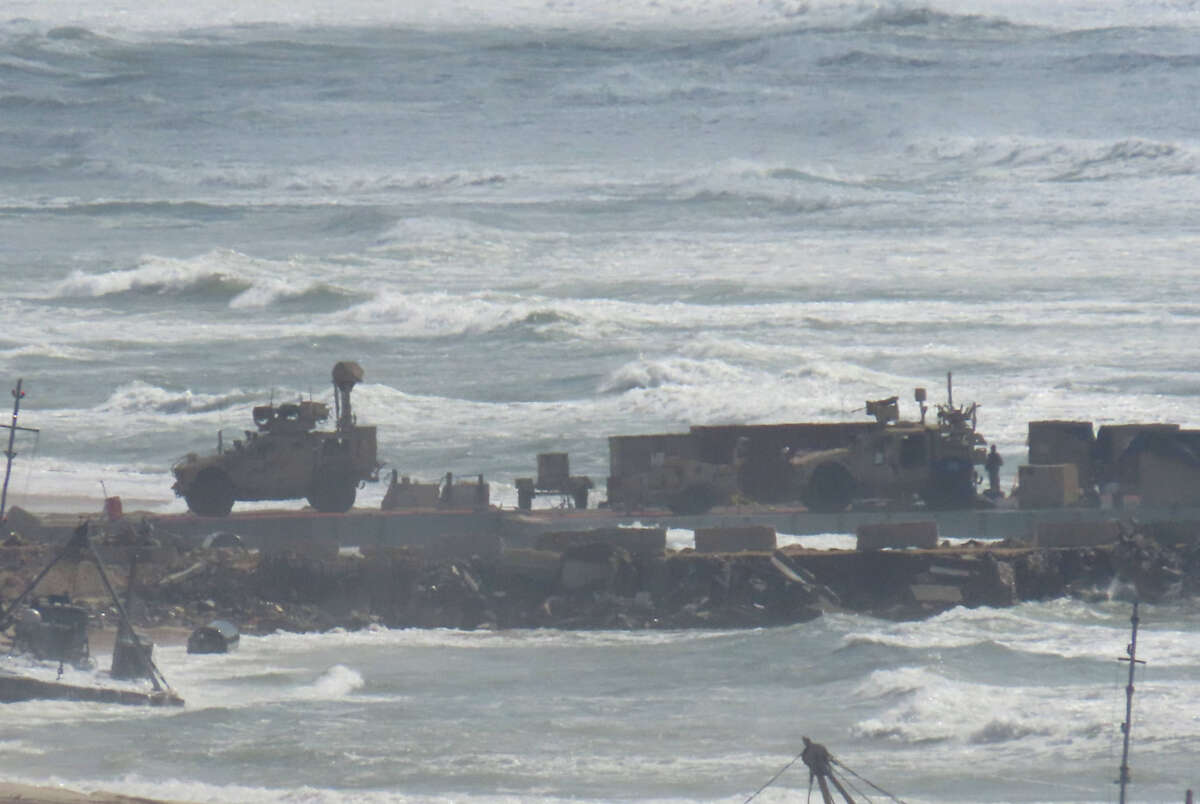Honest, paywall-free news is rare. Please support our boldly independent journalism with a donation of any size.
As the U.S. prepares to permanently wind down use of its embarrassingly inept military pier effort in Gaza, the Pentagon has announced that it has once again failed to connect the pier this week as promised because of weather-related issues, potentially bringing a fitting end to the pier effort that was nothing short of disastrous for the two months since it was connected.
U.S. officials said earlier this week that the military planned to permanently remove the pier soon, after reconnecting it on Wednesday for a few days in order to deliver aid that has accumulated as the pier has been disconnected.
But the Pentagon said on Thursday that U.S. officials were unable to re-anchor the pier as planned, due to “technical and weather-related issues,” according to Pentagon Press Secretary Pat Ryder.
There is currently no date set to make another attempt. Officials did not make clear whether or not they will try again, but did confirm that the pier will be permanently removed soon — months earlier than the original estimated end date of September. The pier effort has cost $230 million.
These “technical and weather-related issues” have plagued the pier ever since it was first attached in May. The pier has been operational for roughly a third of the time since then, having been disconnected five times since its installation.
President Joe Biden touted the pier during his State of the Union address in March, saying that it would be a vital effort to deliver much-needed humanitarian aid to Palestinians in Gaza. The idea was immediately panned by humanitarian groups, who said that a pier was one of the least effective ways to deliver aid into the region — the most efficient way being a ceasefire and surge of aid into the region through ground corridors that Israel has been blocking for months.
Many aid groups and advocates for Palestinian rights said that the pier was a distraction from the Biden administration’s role in Israel’s genocidal massacre in Gaza, including its campaign of famine, disease and dehydration through the blocking of aid and targeting of crucial infrastructure.
Indeed, Palestinians have questioned the pier for its role in allowing U.S. troops to have a presence in Gaza — though the U.S. is insistent that no soldier has stepped foot on the ground — while delivering, in essence, no aid. The U.S. has also confirmed that the area around the pier was used by Israeli forces to help stage their massacre in Nuseirat in June, in which troops retrieved four Israeli hostages and killed 274 Palestinians, injuring 698 more.
The UN stopped delivering goods from the pier last month because of concerns over the Israeli military’s presence in the area and sustained attacks on humanitarian groups; indeed, just on Friday, an Israeli air strike killed four humanitarian workers in Israel’s designated “humanitarian safe zone” in Al-Mawasi, including at least one worker from a U.K.-based group.
Because of this, what little aid has made it into Gaza through the pier has largely not been delivered to Palestinians, instead rotting on the beach as Palestinians die just miles away due to starvation or wounds caused by Israeli strikes.
The administration has notably declined to say how much of the aid that has made it into Gaza has been delivered. In Ryder’s statement, he notes that the pier has allowed nearly 20 million pounds of aid into “the marshaling area where it can be collected by humanitarian organizations for onward delivery and distribution” — a specifically worded statement that simply says organizations “can” collect the goods, not that they’ve actually done so.
When it was first announced, Biden claimed that the pier was going to deliver 2 million meals a day to Palestinians — a goal that now seems laughable considering the reality of what the pier has done.
“I’ve been disappointed that some of the things that I’ve put forward have not succeeded as well, like the port we attached from Cyprus,” Biden said of the pier during his widely-watched press conference on Thursday night. “I was hopeful that would be more successful.”
Matching Opportunity Extended: Please support Truthout today!
Our end-of-year fundraiser is over, but our donation matching opportunity has been extended! All donations to Truthout will be matched dollar for dollar for a limited time.
Your one-time gift today will be matched immediately. Your monthly donation will be matched for the whole first year, doubling your impact.
This matching gift comes at a critical time. As Trump attempts to silence dissenting voices and oppositional nonprofits, reader support is our best defense against the right-wing agenda.
Help Truthout confront Trump’s fascism in 2026, and have your donation matched now!
